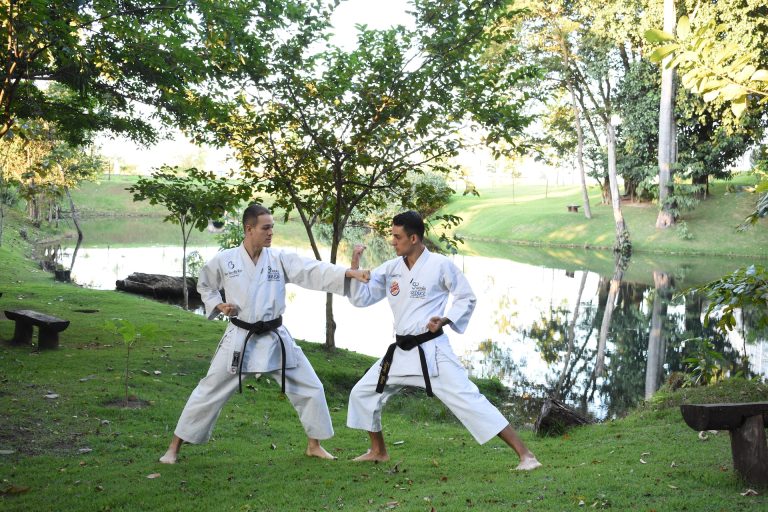How can I learn karate at home?
Karate is a form of martial art that originated in Okinawa, Japan. It is a physical and mental discipline that helps people develop self-defense skills, physical fitness, and mental agility. Many people are interested in learning karate but find it difficult to attend regular classes in a dojo or martial arts studio. If you’re one of those people, don’t worry. It’s possible to learn karate at home with some dedication and proper guidance.
1. Find a good instructor
The first step to learning karate at home is to find a good instructor. Look for instructors or schools that offer online courses or video tutorials. Check their credentials and reviews to ensure that they have a good reputation and can provide quality instruction. It’s also important to find an instructor who can offer personalized feedback and corrections to help you improve your technique.
2. Set up a training space
Once you have found an instructor, set up a training space at home. Choose a room or space with sufficient light, ventilation and enough room to move your limbs without any hazard. You may need a mat or soft surface to practice on. It’s recommended to practice in front of a mirror to help you check your form and posture.
3. Develop a training plan
Develop a training plan that suits your skills, fitness level, and schedule. A good training plan should include warm-up exercises, stretching, basic techniques, and kata (forms). Commit to practicing regularly, ideally daily to help develop muscle memory and skill acquisition. It’s also important to gradually increase the intensity and difficulty level of your training to challenge yourself and improve your abilities.
4. Pay attention to technique and form
In karate, technique and form are paramount. Pay attention to the technical details, such as the positioning of your feet, arms, and head, as well as the proper execution of each technique. It’s important to take your time to master each movement and focus on accuracy and precision, rather than speed or power. Incorrect technique can cause injury and limit your progress in the long run.
5. Study karate theory and history
Karate is not only about physical movement but also has a rich history and philosophy. Take time to learn about the different types of techniques, Kata, the history of Karate, and the philosophies that underlie it. Studying these theories and histories will give you a better understanding of the discipline and help you develop a deeper appreciation for the art.
6. Join an online karate community
Joining an online karate community can provide support, encouragement, and motivation to continue your practice. These communities provide opportunities to connect with other people learning karate and access to instructors who can provide feedback and guidance. Some online karate communities provide virtual sparring and competitions that help you test your skills and grow.
Frequently Asked Questions about Learning Karate at Home
Karate is a martial art that not only teaches self-defense but also promotes physical and mental fitness. Due to the current situation, more and more people are looking for ways to learn karate at home. Here are some of the most frequently asked questions about learning karate at home:
1. Can I really learn karate at home?
Yes, you can learn karate at home. There are a lot of resources available online such as videos, online courses, and even one-on-one virtual training sessions with instructors. However, it’s important to note that learning karate at home won’t replace attending a class with a qualified instructor.
2. What do I need to get started with learning karate at home?
To get started with learning karate at home, you will need a clear and open space where you can practice without distractions or obstructions. You will also need comfortable clothes that allow you to move freely, a water bottle to keep yourself hydrated, and of course, a willingness to learn.
3. Do I need any equipment to learn karate at home?
Initially, you don’t need any equipment to learn karate at home. However, as you progress, you might need some equipment such as a punching bag, practice targets, or training weapons. For beginner level, you can skip the equipment and just focus on learning the basic moves.
4. How long does it take to learn karate at home?
The time it takes to learn karate at home vary from person to person. It depends on how often you practice, how quickly you pick up the moves, and how diligent you are in your training. However, the learning process is not limited to a specific time frame – the best way to learn karate is to continue practicing and improving yourself.
5. Is it safe to learn karate at home?
It is safe to learn karate at home as long as you follow proper safety precautions. You need to prepare a safe learning environment before you start your training. You should always warm up and stretch before every session to prevent any injuries. It’s important to have proper form and technique when practicing Karate moves in order to avoid injuries or sprain muscles.
6. Can I earn a rank or belt if I learn karate at home?
It’s possible to earn a rank or belt if you learn karate at home, but you need to follow the proper procedures like participating in virtual gradings or attending in-person evaluations. It’s important to remember that the rank or the belt does not just depend on knowledge and skill, but also on values like respect, discipline and attitude.
How to Learn Karate at Home: A Step-by-Step Guide
Karate is a popular martial art that can be learned from the comfort of your own home. With dedication, hard work, and consistency, you can learn the basics and beyond of karate without ever stepping foot in a dojo. This guide will provide you with clear step-by-step instructions on how to learn karate at home.
Step 1: Research the Basics of Karate
Before you start learning karate, it’s important to do some research about the basics of this martial art. You can find a wealth of information online and in books, which will help you understand the basic principles of karate such as stances, strikes, blocks, and kicks. You can also find videos of karate demonstrations on sites like YouTube.
Step 2: Choose an Online Karate Program
To learn karate at home, it’s important to choose a reputable online karate program or course. You can find many online karate programs that provide step-by-step instructions, detailed techniques, and video demonstrations. Some popular online karate programs include Karate by Jesse, Karate Academy Online, and Karate 1.
Step 3: Set Up Your Training Space
To practice karate at home, it’s important to create a training space that is free of obstacles and distractions. Clear out any furniture or objects that may get in the way of your movements. It’s also important to have a mirror in your training space, so you can observe and correct your form.
Step 4: Start with Warm-Ups and Stretching
Before you start practicing karate techniques, it’s crucial to perform warm-ups and stretching exercises to prepare your body for physical activity. This will help prevent injuries and improve your flexibility. Examples of warm-ups and stretches for karate include jumping jacks, sit-ups, deep lunges, and shoulder stretches.
Step 5: Practice Basic Techniques and Drills
Once you’ve warmed up, it’s time to start practicing basic karate techniques and drills. Start with simple moves like punches and kicks, and gradually progress to more advanced techniques like strikes, blocks, and throws. Practice each technique repeatedly until you feel comfortable with it.
Step 6: Incorporate Kumite and Sparring
An important aspect of karate is kumite, which is sparring with an opponent. To practice this at home, you can find a partner to train with or use a punching bag or dummy. Kumite allows you to apply the techniques you have learned in a practical setting, and helps you develop your reflexes and timing.
Step 7: Stay Consistent and Dedicated
Learning karate at home requires dedication and consistency. To become proficient at karate, it’s important to practice regularly, even if it’s just for a few minutes a day. Set a regular training schedule and stick to it. You can also join online karate communities or forums for extra motivation and support.
Conclusion
Learning karate at home is a rewarding and challenging endeavor. With the proper research, techniques, and consistent practice, you can achieve mastery in this martial art. Remember to always prioritize safety and proper form when practicing karate at home. Good luck on your karate journey!
Inhaltsverzeichnis






